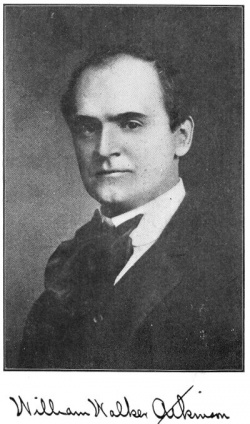
Not only are we largely what we have thought ourselves into being, but we have around us largely those things that we have attracted to us by our thoughts. This may be objected to by some who say that they have reaped the things they feared, rather than the things they desired . . “the thing I feared has come upon me.” But what of that? Is not a fear a mental state as much as is desire? Fear is the negative pole of the mental state of which the positive pole is desire. In both cases a strong mental picture is held, and the thought processes are set into operation to materialize it into objectivity.
The man who continually holds the mental picture of poverty in his mind, surely attracts those conditions to him. The man who holds the idea of prosperity before him attracts his own to himself. And right here, at this very place, we wish to give you the antidote and remedy for fear. It is this: If you dislike a thing, and therefore find yourself evincing a fear that it may materialize in your life . . stop right there and take mental stock of yourself. Then begin by steadily refusing to allow your mind to dwell upon the fear, but in its place build up the desire for, and the thought picture of, the very opposite thing . . the thing or condition which if realized will save you from the thing you are beginning to fear.
Then concentrate all your efforts upon the mental growth of this idea, desire, feeling, and hope for the thing you want . . and try to forget the thing you have feared, driving it out of your mind by will, and determination. You will find that by cultivating and dwelling upon the positives, you will neutralize and kill out the negatives. If you will but realize the value of this little bit of advice that we have just given you; and will begin to act upon it, you will ever look back upon this moment of the first reading of it, with feelings of joy and thankfulness. For it is the antidote for fear . . and fear is the deadly nightshade of the mind.
Each of us is a great thought-magnet, ever drawing to us things, persons, and environment . . circumstances even . . in harmony with our composite thoughts, and tending to enable those thoughts to express themselves. And at the same time we are ever repelling, driving away and repulsing the things of the opposite character. This being so, does it not become of the greatest importance for us to cultivate the right sort of thought-magnet, that we may draw to ourselves that which we would desire?
Does it not become our duty to drive out from our thought realm the thoughts that tend to attract to us the people and conditions calculated to pull us down in the quicksands of life?
Does it not become our duty to ourselves to drag up by the roots that deadly nightshade of the mind . . Fear? And with it its companion plants of Hate, Anger and jealousy, all of which tend to bring about undesirable conditions for us . . and all of which are negatives and not positives?
We are all thought-magnets whether we wish to be or not. And this being so is it not the height of folly to refuse to take advantage of the understanding of this law, and to cultivate the positive qualities of thought that will serve to draw to us the things that will aid us, and bring us greater happiness, health, and success? If asked to choose between the results of the positive qualities, and those of the negative qualities, no sane man or woman would hesitate a moment.
And yet many shiver on the brink of the great lake of life, unable to decide whether it is worthwhile to choose between the boat of Positivity which will take them safely across to the shore of Attainment, by the use of the oars of the will and the reason, on the one hand; or the rotten, heavy, flat-bottomed scow of Negativity, which has no oars, but just “drifts” along until it becomes waterlogged and sinks, on the other hand. It is a matter for your own choice. We have pointed out the way, and stated the rules . . you must do the rest. In the pattern of the day: “It is now up to you.”
Edward Walker/William Walker Atkinson
Excerpt From
